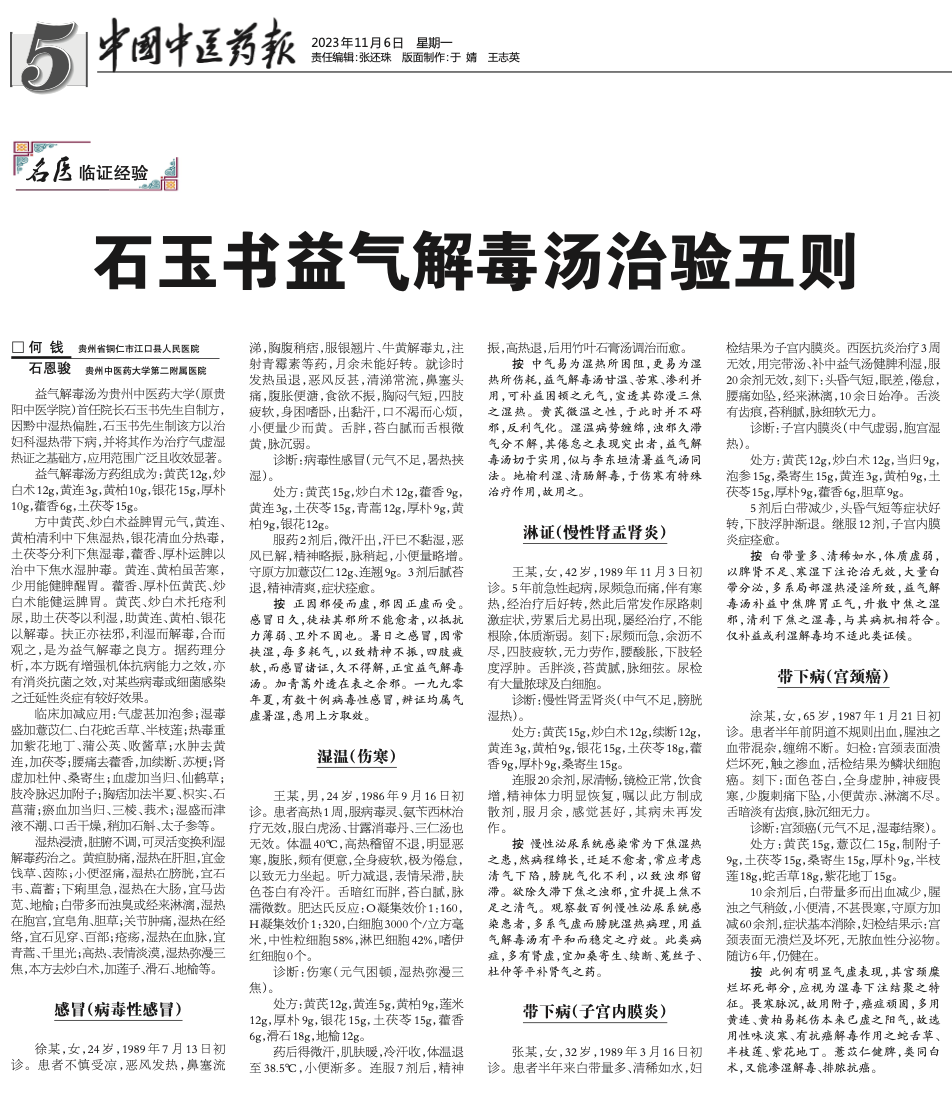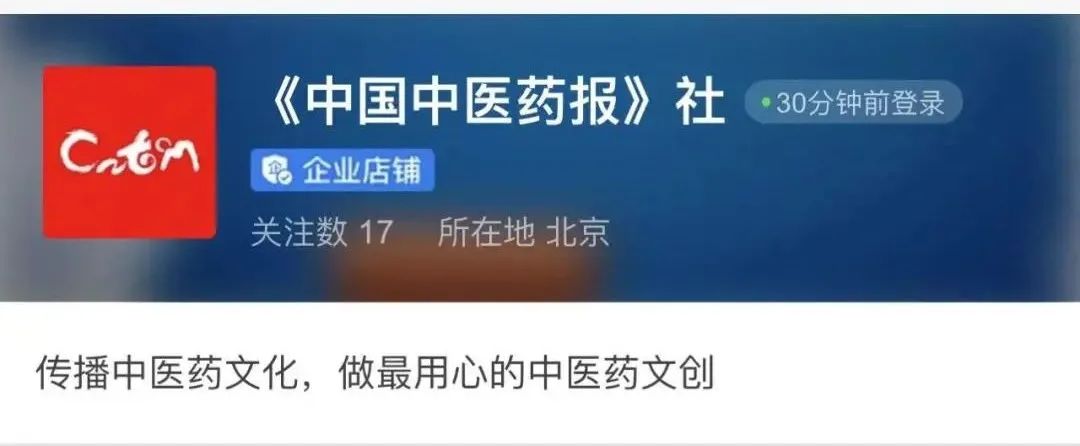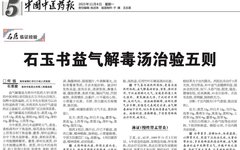 Click the above “Public Account” to subscribe!
Click the above “Public Account” to subscribe!
Source|China Traditional Chinese Medicine News
Written by|He Qian, Jiangkou County People’s Hospital, Tongren City, Guizhou Province; Shi Enjun, Second Affiliated Hospital of Guizhou University of Traditional Chinese Medicine

Yiqi Jiedu Decoction was formulated by Mr. Shi Yushu, the first president of Guizhou University of Traditional Chinese Medicine (formerly Guiyang College of Traditional Chinese Medicine). Due to the prevalence of damp-heat in central Guizhou, Mr. Shi created this formula to treat gynecological damp-heat discharge diseases and established it as a fundamental formula for treating Qi deficiency with damp-heat syndrome, with a wide range of applications and significant efficacy.
Yiqi Jiedu Decoction Ingredients consist of: Huang Qi (Astragalus) 12g, Chao Bai Zhu (Fried Atractylodes) 12g, Huang Lian (Coptis) 3g, Huang Bo (Phellodendron) 10g, Yin Hua (Honeysuckle) 15g, Hou Po (Magnolia Bark) 10g, Huo Xiang (Agastache) 6g, Tu Fu Ling (Smilax) 15g.
In this formula, Huang Qi and Chao Bai Zhu tonify the spleen and stomach Qi, Huang Lian and Huang Bo clear damp-heat from the lower jiao, Yin Hua clears heat and toxins from the blood, Tu Fu Ling promotes the resolution of damp toxins from the lower jiao, and Huo Xiang and Hou Po regulate the spleen to treat water retention and toxins in the middle and lower jiao. Although Huang Lian and Huang Bo are bitter and cold, their minimal use can strengthen the spleen and awaken the stomach. Huo Xiang and Hou Po work with Huang Qi and Chao Bai Zhu to enhance spleen and stomach function. Huang Qi and Chao Bai Zhu promote wound healing and diuresis, assisting Tu Fu Ling in draining dampness and supporting Huang Lian, Huang Bo, and Yin Hua in detoxification. This formula not only tonifies the righteous Qi but also expels pathogens, drains dampness, and detoxifies, making it an excellent formula for tonifying Qi and detoxifying. Pharmacological analysis shows that this formula enhances the body’s resistance to disease and has anti-inflammatory and antibacterial effects, particularly effective against certain viral or bacterial infections with prolonged inflammation.
Clinical Modifications: For severe Qi deficiency, add Pao Shen (Codonopsis); for severe damp toxins, add Yi Yi Ren (Job’s Tears), Bai Hua She She Cao (Hedyotis); for heavy heat toxins, add Zi Hua Di Ding (Viola) and Pu Gong Ying (Dandelion); for edema, remove Huang Lian and add Fu Ling (Poria); for low back pain, remove Huo Xiang and add Xu Duan (Dipsacus) and Su Geng (Perilla); for kidney deficiency, add Du Zhong (Eucommia) and Sang Ji Sheng (Mulberry Mistletoe); for blood deficiency, add Dang Gui (Angelica) and Xian He Cao (Agrimonia); for cold limbs and weak pulse, add Fu Zi (Aconite); for chest oppression, add Ban Xia (Pinellia), Zhi Shi (Bitter Orange), and Shi Chang Pu (Acorus); for blood stasis, add Dang Gui, San Leng (Sparganium), and E Zhu (Curcuma); for excessive dampness with dry mouth and tongue, slightly add Shi Hu (Dendrobium) and Tai Zi Shen (Pseudostellaria).
Damp-heat infiltration and organ dysfunction can be flexibly treated with damp-resolving and detoxifying herbs. For jaundice and hypochondriac pain, if damp-heat is in the liver and gallbladder, use Jin Qian Cao (Lysimachia) and Yin Chen (Virgate Wormwood); for painful and difficult urination, if damp-heat is in the bladder, use Shi Wei (Pyrrosia) and Bian Xu (Polygonum); for diarrhea with urgency, if damp-heat is in the large intestine, use Ma Chi Xian (Portulaca) and Di Yu (Sanguisorba); for excessive and foul-smelling leukorrhea or prolonged menstruation, if damp-heat is in the uterus, use Zao Jiao (Soapberry) and Dan Cao (Bitter Herb); for joint swelling and pain, if damp-heat is in the meridians, use Shi Jian Chuan (Dichroa) and Bai Bu (Stemona); for sores and ulcers, if damp-heat is in the blood vessels, use Qing Hao (Artemisia) and Qian Li Guang (Euphorbia); for high fever and dull expression, if damp-heat is diffused in the three jiao, this formula can remove Chao Bai Zhu and add Lian Zi (Lotus Seed), Hua Shi (Talc), and Di Yu.
Common Cold (Viral Cold)
XU, female, 24 years old, first diagnosed on July 13, 1989. The patient accidentally caught a chill, experiencing aversion to wind, fever, nasal congestion, and runny nose, with slight chest and abdominal distension. After taking Yin Qiao Pian (Yin Qiao Tablets), Niu Huang Jie Du Wan (Niu Huang Detox Tablets), and receiving penicillin injections for over a month, there was no improvement. Upon examination, although the fever had subsided, the aversion to wind was more pronounced, with constant clear nasal discharge, nasal congestion, headache, abdominal distension, loose stools, poor appetite, chest tightness, shortness of breath, fatigue, and a tendency to sleep, with sticky sweat, no thirst but irritability, and scanty yellow urine. The tongue was swollen with a white greasy coating and slightly yellow at the root, and the pulse was weak and deep.
Diagnosis: Viral cold (Qi deficiency with summer heat and dampness).
Prescription: Huang Qi 15g, Chao Bai Zhu 12g, Huo Xiang 9g, Huang Lian 3g, Tu Fu Ling 15g, Qing Hao 12g, Hou Po 9g, Huang Bo 9g, Yin Hua 12g.
After taking 2 doses, the patient experienced slight sweating, the sweat was no longer sticky, the aversion to wind had resolved, and her spirit improved slightly, with a slightly stronger pulse and slightly increased urine output. The original formula was maintained with the addition of Yi Yi Ren 12g and Lian Qiao 9g. After 3 doses, the greasy coating receded, and the patient felt refreshed, with symptoms resolved.
Note: The root cause of the illness is the invasion of pathogens leading to deficiency, and the pathogens are able to invade due to the deficiency of the righteous Qi. A prolonged cold is often not resolved simply by expelling the pathogens, as it is due to weak resistance and instability of the exterior. Colds in hot summer often carry dampness, which consumes Qi, leading to fatigue and weakness, and the symptoms of the cold persist. Therefore, Yiqi Jiedu Decoction is appropriate. Adding Qing Hao helps to expel the residual pathogens from the exterior. In the summer of 1990, there were dozens of cases of viral colds, all diagnosed as Qi deficiency with summer heat and dampness, and all responded well to this formula.
Damp-Warmth (Typhoid Fever)
WANG, male, 24 years old, first diagnosed on September 16, 1986. The patient had a high fever for a week, and treatments with Virus Ling, Ampicillin, Bai Hu Tang (White Tiger Decoction), Gan Lu Xiao Du Dan (Sweet Dew Detox Pill), and San Ren Tang (Three Nut Decoction) were ineffective. His temperature was 40°C, with persistent high fever, significant chills, abdominal distension, frequent urge to defecate, extreme fatigue, and inability to sit up. Hearing was diminished, expression was dull, skin was pale with cold sweat. The tongue was dark red and swollen, with a white greasy coating, and the pulse was weak and rapid. The Widal test showed O agglutination titer of 1:160, H agglutination titer of 1:320, with a white blood cell count of 3000/mm³, neutrophils 58%, lymphocytes 42%, and no eosinophils.
Diagnosis: Typhoid fever (Qi stagnation with damp-heat diffused in the three jiao).
Prescription: Huang Qi 12g, Huang Lian 5g, Huang Bo 9g, Lian Mi (Lotus Seed) 12g, Hou Po 9g, Yin Hua 15g, Tu Fu Ling 15g, Huo Xiang 6g, Hua Shi (Talc) 18g, Di Yu 12g.
After taking the medicine, the patient experienced slight sweating, skin warming, cold sweat subsided, and body temperature decreased to 38.5°C, with gradually increasing urine output. After taking 7 doses, the spirit improved, and the high fever subsided. Subsequently, he was treated with Zhu Ye Shi Gao Tang (Bamboo Leaf and Gypsum Decoction) and recovered.
Note: The middle Qi is easily obstructed by damp-heat, which can also easily damage and consume it. Yiqi Jiedu Decoction, with its sweet warmth, bitter cold, and draining properties, can replenish the stagnant righteous Qi and disperse the diffused damp-heat in the three jiao. The slightly warm nature of Huang Qi does not hinder the pathogens at this time but rather benefits Qi transformation. In cases of damp-warmth where the condition is prolonged and the turbid pathogens linger in the Qi level, leading to prominent fatigue, Yiqi Jiedu Decoction is particularly useful, similar to Li Dongyuan’s Qing Shu Yi Qi Tang (Clear Summer Heat and Tonify Qi Decoction). Di Yu drains dampness and clears the intestines, having a special therapeutic effect on typhoid fever, hence its inclusion.
Lin Syndrome (Chronic Pyelonephritis)
WANG, female, 42 years old, first diagnosed on November 3, 1989. Five years ago, the patient had an acute onset with frequent and painful urination, accompanied by chills and fever. After treatment, she improved, but since then, she has frequently experienced urinary tract irritation symptoms, especially after exertion, and despite multiple treatments, it could not be eradicated, leading to a gradual decline in her constitution. Currently: frequent and urgent urination, residual dribbling, fatigue in the limbs, weakness, low back pain, and mild lower limb edema. The tongue was swollen and pale, with a yellow greasy coating, and the pulse was thin and wiry. Urinalysis showed a large number of pus cells and white blood cells.
Diagnosis: Chronic pyelonephritis (Qi deficiency with bladder damp-heat).
Prescription: Huang Qi 15g, Chao Bai Zhu 12g, Xu Duan 12g, Huang Lian 3g, Huang Bo 9g, Yin Hua 15g, Tu Fu Ling 18g, Huo Xiang 9g, Hou Po 9g, Sang Ji Sheng 15g.
After taking more than 20 doses, urination became clear and smooth, urinalysis returned to normal, appetite increased, and energy and strength significantly improved. The patient was advised to prepare this formula as a powder and take it for over a month, feeling very well, with no recurrence of the illness.
Note: Chronic urinary tract infections are often due to damp-heat in the lower jiao, but for those with prolonged courses and unresolved conditions, one should consider the failure of clear Qi to descend and the obstruction of bladder Qi transformation, leading to the retention of turbid pathogens. To eliminate the long-stagnant turbid pathogens in the lower jiao, it is necessary to elevate the insufficient clear Qi from the upper jiao. Observations of hundreds of chronic urinary tract infection patients show that most are due to Qi deficiency and bladder damp-heat pathology, and Yiqi Jiedu Decoction has a harmonious and stabilizing therapeutic effect. Such conditions often involve kidney deficiency, so it is advisable to add Sang Ji Sheng, Xu Duan, Tu Si Zi (Cuscuta), and Du Zhong to tonify kidney Qi.
Leukorrhea Disease (Endometritis)
ZHANG, female, 32 years old, first diagnosed on March 16, 1989. The patient has had an increase in leukorrhea for half a year, which is clear and thin like water, with gynecological examination results indicating endometritis. Western medicine anti-inflammatory treatment for 3 weeks was ineffective, and after using Bai Tang (Leukorrhea Decoction) and Bu Zhong Yi Qi Tang (Tonify the Middle and Boost Qi Decoction) to strengthen the spleen and drain dampness, over 20 doses were ineffective. Currently: dizziness, shortness of breath, poor sleep, fatigue, low back pain, and prolonged menstruation lasting over 10 days. The tongue was pale with tooth marks, slightly greasy coating, and the pulse was thin, soft, and weak.
Diagnosis: Endometritis (weak middle Qi with damp-heat in the uterus).
Prescription: Huang Qi 12g, Chao Bai Zhu 12g, Dang Gui (Angelica) 9g, Pao Shen 15g, Sang Ji Sheng 15g, Huang Lian 3g, Huang Bo 9g, Tu Fu Ling 15g, Hou Po 9g, Huo Xiang 6g, Dan Cao 9g.
After 5 doses, leukorrhea decreased, dizziness and shortness of breath improved, and lower limb edema gradually subsided. After taking 12 more doses, the endometritis was cured.
Note: The excessive leukorrhea, which is clear and thin like water, indicates a weak constitution, and treatment based on spleen and kidney deficiency with cold dampness was ineffective. The excessive leukorrhea is often caused by local damp-heat infiltration. Yiqi Jiedu Decoction tonifies the middle jiao spleen and stomach righteous Qi, disperses the dampness in the middle jiao, and clears the damp toxins from the lower jiao, aligning with the pathogenesis. Simply tonifying or draining dampness and detoxifying is not suitable for this type of syndrome.
Leukorrhea Disease (Cervical Cancer)
TU, female, 65 years old, first diagnosed on January 21, 1987. The patient experienced irregular vaginal bleeding with foul-smelling blood for half a year, which was persistent. Gynecological examination revealed cervical ulceration and necrosis, with biopsy results indicating squamous cell carcinoma. Currently: pale complexion, generalized edema, fatigue, aversion to cold, stabbing pain and heaviness in the lower abdomen, yellow and scanty urination. The tongue was dark and pale with tooth marks, and the pulse was deep, thin, and weak.
Diagnosis: Cervical cancer (Qi deficiency with damp-heat accumulation).
Prescription: Huang Qi 15g, Yi Yi Ren 15g, Zhi Fu Zi (Processed Aconite) 9g, Tu Fu Ling 15g, Sang Ji Sheng 15g, Hou Po 9g, Ban Zhi Lian (Scutellaria) 18g, She She Cao (Hedyotis) 18g, Zi Hua Di Ding 15g.
After taking more than 10 doses, the amount of leukorrhea increased while bleeding decreased, the foul odor diminished, urination became clearer, and the patient felt less cold. The original formula was adjusted and taken for over 60 doses, with symptoms basically eliminated, and gynecological examination results showed no ulceration or necrosis, with no purulent or bloody discharge. Follow-up after 6 years showed the patient was still healthy.
Note: This case shows significant Qi deficiency, and the necrotic part of the cervix should be viewed as a manifestation of damp-heat accumulation. The aversion to cold and deep pulse indicate the use of Fu Zi. Cancer is stubborn, and the use of Huang Lian and Huang Bo can easily consume the already deficient Yang Qi, hence the selection of herbs with mild cold properties and detoxifying effects such as She She Cao, Ban Zhi Lian, and Zi Hua Di Ding. Yi Yi Ren tonifies the spleen, similar to Bai Zhu, and also drains dampness, detoxifies, and has anti-cancer properties.
(Click the image to subscribe to the newspaper)

 (Enter the micro-store to purchase cultural products)
(Enter the micro-store to purchase cultural products)
Welcome to follow!!
“China Traditional Chinese Medicine News” Douyin account: 36254766218
Editor|Wang Qingyun
Reviewed by|Li Xiuyun, Li Rui


